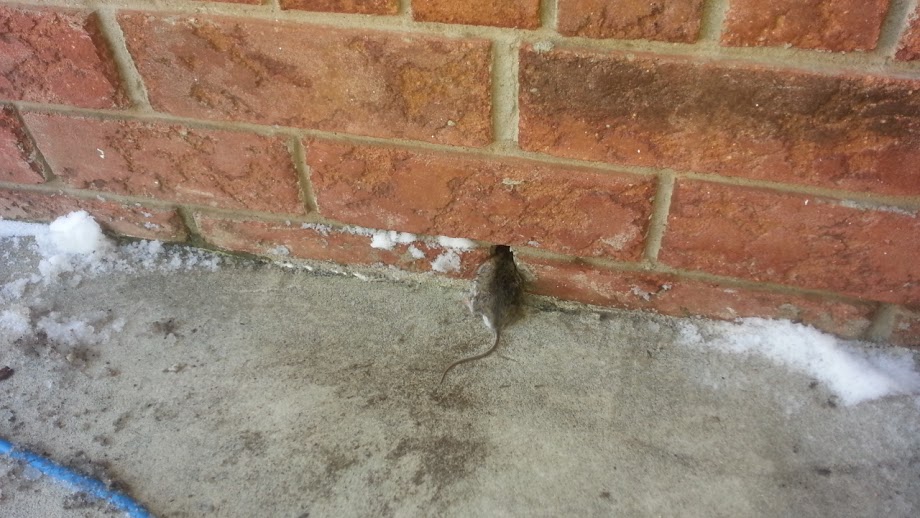Mice may not bother you when they live outside, but you don't want to share your home with rodents because they can carry contagious diseases and damage your food supply. Due to their rapid reproduction, having a few mice in your home can turn into a full-blown infestation in a matter of weeks, so it's best to take quick action if you think a mouse is living inside the recesses of your house.
Avoid Risk By Deterring Mice
One of the biggest risks of living with mice is that they often carry dangerous diseases that are transmitted through droppings. Even the simple act of cleaning up mouse droppings puts you at risk of health problems. Rodents can also destroy your food supply by getting into your cabinets and pantry in search of sustenance, and finally, mice are notorious for gnawing on wires and chewing holes in baseboards and walls. Not only is the habit inconvenient, but it also poses a threat of electrical problems.
Recognize the Signs of a Mouse Infestation
Because mice are most active at night, you may not see the creatures even if they have taken up residence in your home. The following signs are clues that indicate you are sharing your home with rodents:
-
Gnaw and scratch marks on food containers
-
Small piles of droppings
-
Scurrying noises in the wall
Use Preventative Measures To Keep Mice Away
Once a professional technician has gotten rid of the mice in your home, you should start implementing a few habits to keep the problem from reoccurring. It's not enough to simply remove the rodents from your home; other mice will take their place if you don't take steps to make your house a less hospitable environment for them.
Patching all visible holes in the exterior of your house is a good place to start. The experts at Skedaddle can help you identify how rodents access your home so you can keep them out. For small holes, caulk is often a sufficient solution, but you may need to board up larger holes or even replace the siding of your house if there are numerous cracks and crevices in the exterior. You should also check your roof for loose shingles and weak boards underneath because these can also serve as entry points for rodents.
However, you also need to remember that even if mice can access your home, they will only stay if they think it is a good environment. They are looking for easy sources of food and good places to build nests, so if you can eliminate these two things, you can drastically reduce the chances of having another mouse infestation in your home.
Start by keeping your kitchen clean and organized. Sweep up any crumbs throughout the day and clean up accidental spills immediately. Mice are most active at night, so it's especially important to have a clean kitchen before you go to bed. Clean the dishes in the sink and wipe down your counters to avoid giving rodents a chance to feast. Finally, you should make sure that all of the food in your pantry is stored properly. Instead of leaving food in open packages, store items like cereal, sugar, cookies and flour in airtight containers to avoid attracting mice.
Keeping your home free of clutter is also a good technique for deterring mice. Unorganized attics and basements give rodents plenty of quiet places to build nests, so decluttering is useful for eliminating nests. This practice also gives mice fewer materials to use to make nests. Rodents are notorious for using any material they can find, including carpet fibers, paper scraps and string pieces, to make nests. By eliminating unnecessary items in your home, you also get rid of many materials mice use to make nests so they are less likely to take up residence.
Remember that none of these preventative measures is guaranteed to prevent rodents. They simply make your home a less ideal environment for rodents. Working with a professional in addition to using these habits is the best way to take care of a mouse problem.
Why Call Skedaddle Wildlife for Help?
You may think that a mouse infestation is a problem you can fix with a few traps, but it is never a good idea to attempt mouse removal on your own. Even if you suspect you are only dealing with a few mice rather than a full-blown infestation, you should always call a professional such as the ones at Skedaddle Humane Wildlife Control for help.
One reason professional assistance is more effective than DIY mouse removal is that mice reproduce at a rapid rate. A single female can give birth to a litter of up to 12 kits every 21 days, so if you miss even one mouse with your traps, you may quickly find yourself back in the same situation. An expert can ensure every mouse is removed from the house so you don't have future rodent problems.
Removing mice yourself also does not address the issue of how the rodents entered your house. A professional understands that mice can squeeze through holes as small as 6 millimeters in diameter, and our team at Skedaddle can point out potential points of entry and show you how to eliminate them to keep the problem from recurring.
Finally, removing mice yourself also poses a risk to your health. It is never safe to handle rodents or droppings without the proper equipment, so you should let Skedaddle handle mouse removal to avoid the risk of contracting a dangerous disease.
Choose a Professional for Mouse Removal
If you have mice living in your home, you need professional help to get rid of them. Skedaddle Humane Wildlife Control is ready to help, and we can give you advice on how to keep mice away in the future. Contact us today for help with mice control.



